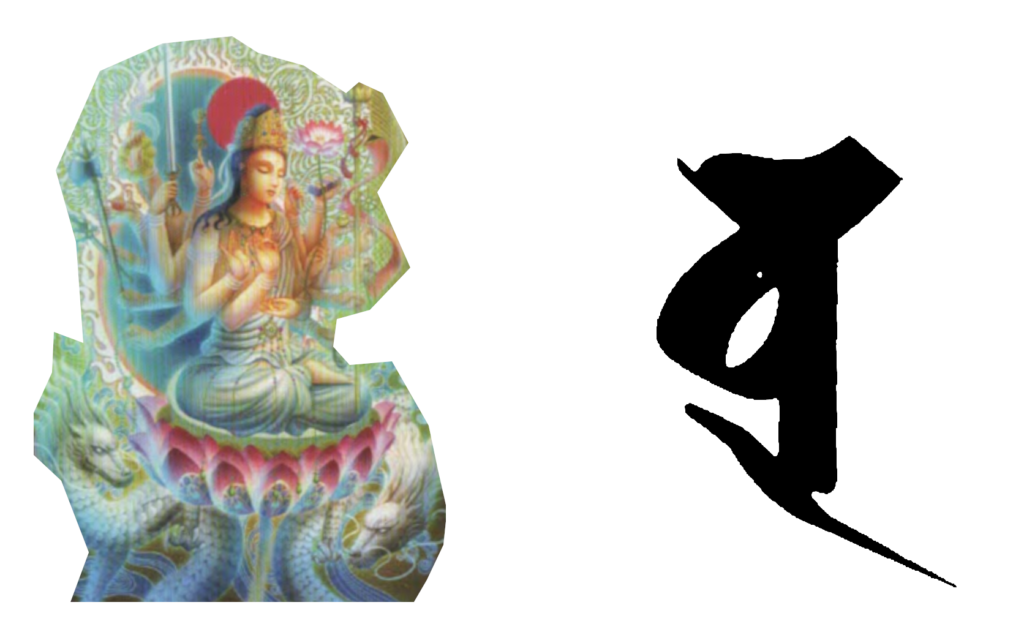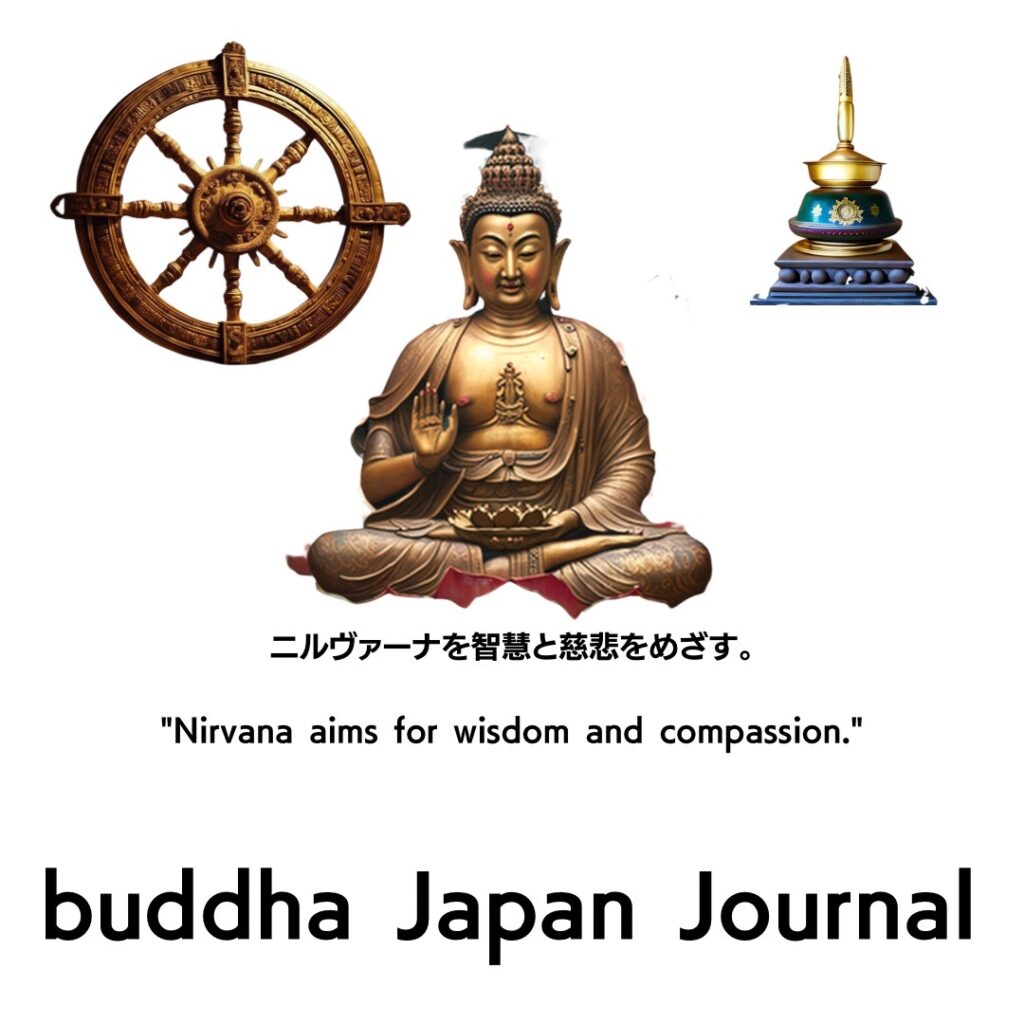The Heart Sutra is a Buddhist scripture that is widely regarded as a summary of the essence of Buddhist teachings. It is part of the Perfection of Wisdom (Prajñāpāramitā) genre of Buddhist literature. The sutra is short and condensed, containing only 260 Chinese characters, but it is considered to be very profound and has been the subject of much commentary and interpretation over the centuries.
The Heart Sutra expresses the idea that all things are empty and devoid of self-nature, and that there is no distinction between samsara (the cycle of birth and death) and enlightenment. It teaches that by realizing the emptiness of all phenomena, one can attain a state of mind that is free from ignorance, craving, and hatred, and thus attain enlightenment.
The Heart Sutra is recited and studied in many Buddhist communities, and is considered to be a highly sacred text. It is often used in meditation and chant practices as a way to help individuals focus the mind and cultivate insight into the nature of reality.

魔訶般若心經
なる観自在は、世のひとすべての悩みを救う真理を求めて、いとふかき者の行に入り給えり。
この行の波羅蜜多において、聖なる観自在菩薩は、この世のものすべて、五蘊いっさいは、本来空な るものと照見たまいて、この真理をもって、世のひとすべての悩み苦しみを解きほどく真実の道となし
舎利子よ。
その教えをここに説くならば、形ありとて形にとらわるべからず。縁あってかりに形を生じたものな れば、縁によっては、また、形なき空なるものに変らん。また、形なしとて無しと思うな、縁によって は、を生じ相をあらわす。
たとえば、かの水を見よ。熱するという縁をあたうれば熱湯となり、蒸気 となって空にとけこむ。さむればふたたび水となり、雨となって地に降りそそぐ。 寒の縁にあわばか たき氷となり、つめたき霜の柱となる。 水の自性に変りなく、ただ縁によってかく変化す。世のことす べてみなこの加し、形あるも無きも本は一体にして、すべて因縁次第なり。
人の心の作用の、受も想も行も、識のはたらき、すべてこの理にほかならず。人は敷き、悲しみ、あるいは喜ぶ、されど、人の性 の内に、 敷き、悲しみ、喜びの、一定の性のあるにはあらず。
因縁因果の理法により、因に応じ、縁が動いて、かりに相をあらわすのみ。これを空の理と云うぞ。
舎利子よ
このように、法の本は、空なる欄である故に、現象の上にては縁によって様々に変化をあらわ すけれども、その本体はいささかもることなし。生ずることもなければ、滅することもなく、るる こともなければ、浄まるということもなし。減ることもなければ、増すこともなし、ただあるものは変化 のみ。
この道理を悟って、この世の成立を見るならば、色あるものも形なきにひとしく、受も、想も、行も、 識のはたらきすべてることなし。また、それらの本なる眼も耳もも舌も身も意もあるにあらず。
六根の対象たる色も声も香りも味わいも触も法もまたあることなし。また、眼界もなく、して
意識界もなし、無明も無ければ、従って、無明の尽くるところもなく、また、老もなく、死もな
よって老と死の尽くるところもなし、苦も、集も、滅も、道も智慧もなく、所得もなしと悟れ。一切心にとどむべからず、これを悟らば一切の罣礙心より去るべし。心に罣礙なければ、迷いも恐れも欲も生ぜず、菩提薩埵はすべからく此の空の真理を体現すべし。
まよいを離れてかならず涅槃を究竟つくさん。 三世に住みたまえるのは、このさとりによって因縁解脱を成就し給えり。この故に、解脱を 求めんとする人は、すべからく、般若波羅蜜多の大神呪を知らねばならぬ。
この大神呪は無上の呪文に無の呪文なり。いっさいの苦厄災難を解脱る呪文にして、その威力はかり難し、すべての真理の中の真理と云うべし。真理であるが故に、いつの世、いかなる時においても変らず、虚偽ならず。
そのにいてく
「空の真理を身につけて、あゆめばやがて行き着かん。
のもと、“ぜよ、ぜよ、ただひたすらに。解脱の彼のに」
Devil’s Heart
Naru Kanjizai joined the line of a thief in search of the truth that will save all the troubles of the world.
In this line of Paramita, the holy Bodhisattva Avalokiteshvara sees that all things in this world, including all the five knots, are originally empty, and with this truth, is the true way to relieve the suffering of all people in the world. none
Shariko.
If you preach the teaching here, you should not be bound by the form even if there is a form. If a form arises due to an edge, depending on the edge, it will also change into a formless, empty thing. Also, don’t think that formlessness is nothingness.
See, for example, that water. If you get the chance to heat it, it will become hot water, and then it will become steam and melt into the sky. When it cools down, it becomes water again, and then falls to the ground as rain. On the brink of cold he becomes a splinter of ice, a pillar of cold frost. The nature of water does not change, but it changes depending on the circumstances. Everything he has done in the world has been added to this, and the book, whether tangible or intangible, is one, and it all depends on fate.
The functions of the human mind, such as receiving, imagining, and acting, and the functions of consciousness, are all nothing other than this truth. People are sad, sad, or happy, but there is no fixed nature of sadness, sadness, or joy within human nature.
According to the theory of cause and effect, the rim moves according to the cause, and only a phase appears. I call this the reason of the sky.
Shariko
In this way, the law book is an empty column, and although the phenomenon shows various changes depending on the edge, the substance itself is not at all. There is no birth, there is no destruction, there is no ruling him, there is no purification. No decrease, no increase, only change.
If you understand this principle and look at the formation of this world, things with color are the same as without form, and there is no function of receiving, thinking, acting, or knowing. Nor do they have eyes, ears, tongues, bodies, and minds.
There are no colors, voices, scents, tastes, touches, or laws that are objects of the six roots. In addition, there is no line of sight, and
There is no world of consciousness, no ignorance, and therefore no end to ignorance, no old age, no death.
Therefore, realize that there is no end to old age and death, no suffering, no collection, no destruction, no path, no wisdom, and no income. Don’t dwell on it at all, and when you realize this, you should get rid of all the troubled minds. If the mind is free from hesitation, fear, or greed, the bodhisattva should inevitably embody the truth of this emptiness.
Leaving Mayoi, you must reach Nirvana. It is through this enlightenment that one can live in the third generation and achieve liberation from karma. Therefore, those who seek liberation must know the Great Divine Curse of Prajnaparamita.
This Great Divine Curse is a supreme spell and a spell of nothingness. It is a spell that relieves all hardships and calamities, and its power is unfathomable. Because it is the truth, it does not change in any age, at any time, and is not false.
go to that
“If you learn the truth of the sky and pursue it, you’ll eventually reach your destination.
Under the message, “Zeyo, zeyo, just earnestly. To him of liberation.”
般若心経の全文
仏説摩訶般若波羅蜜多心経
(ぶっせつまか はんにゃはらみた しんぎょう)
観自在菩薩 行深般若波羅蜜多時 照見五蘊皆空
(かんじざいぼさつ ぎょうじんはんにゃはらみったじ しょうけんごうんかいくう)
度一切苦厄 舎利子 色不異空 空不異色 色即是空
(どいっさいくやく しゃりし しきふいくう くうふいしき しきそくぜくう)
空即是色 受想行識亦復如是 舎利子 是諸法空相
(くうそくぜしき じゅそうぎょうしき やくぶにょぜ しゃりし ぜしょほうくうそう)
不生不滅 不垢不浄 不増不減 是故空中
(ふしょうふめつ ふくふじょう ふぞうふげん ぜこくうちゅう)
無色 無受想行識 無眼耳鼻舌身意 無色声香味触法
(むしき むじゅそうぎょうしき むげんにびぜっしんい むしきしょうこうみそくほう)
無眼界 乃至無意識界 無無明亦 無無明尽
(むげんかい ないしむいしきかい むむみょうやく むむみょうじん)
乃至無老死 亦無老死尽 無苦集滅道 無智亦無得
(ないしむろうし やくむろうしじん むくしゅうめつどう むちやくむとく)
以無所得故 菩提薩埵 依般若波羅蜜多故
(いむしょとくこ ぼだいさつたえ はんにゃはらみったこ)
心無罣礙 無罣礙故 無有恐怖 遠離一切顛倒夢想
(しんむけいげ むけいげこ むうくふ おんりいっさいてんどうむそう)
究竟涅槃 三世諸仏 依般若波羅蜜多故
(くうぎょうねはん さんぜしょぶつ えはんにゃはらみったこ)
得阿耨多羅三藐三菩提 故知般若波羅蜜多
(とくあのくたらさんみゃくさんぼだい こちはんにゃはらみった)
是大神呪 是大明呪 是無上呪 是無等等呪
(ぜだいじんしゅ ぜだいみょうしゅ ぜむじょうしゅ ぜむとうどうしゅ)
能除一切苦 真実不虚 故説般若波羅蜜多呪
(のうじょいっさいく しんじつふこ こせつはんにゃはらみったしゅ)
即説呪日 羯諦 羯諦 波羅羯諦 波羅僧羯諦
(そくせつしゅわっ ぎゃてい ぎゃてい はらぎゃてい はらそうぎゃてい)
菩提薩婆訶 般若心経
(ぼじそわか はんにゃしんぎょう)
仏説摩訶般若波羅蜜多心経
(ぶっせつまか はんにゃはらみた しんぎょう)
観自在菩薩 行深般若波羅蜜多時 照見五蘊皆空
(かんじざいぼさつ ぎょうじんはんにゃはらみったじ しょうけんごうんかいくう)
度一切苦厄 舎利子 色不異空 空不異色 色即是空
(どいっさいくやく しゃりし しきふいくう くうふいしき しきそくぜくう)
空即是色 受想行識亦復如是 舎利子 是諸法空相
(くうそくぜしき じゅそうぎょうしき やくぶにょぜ しゃりし ぜしょほうくうそう)
不生不滅 不垢不浄 不増不減 是故空中
(ふしょうふめつ ふくふじょう ふぞうふげん ぜこくうちゅう)
無色 無受想行識 無眼耳鼻舌身意 無色声香味触法
(むしき むじゅそうぎょうしき むげんにびぜっしんい むしきしょうこうみそくほう)
無眼界 乃至無意識界 無無明亦 無無明尽
(むげんかい ないしむいしきかい むむみょうやく むむみょうじん)
乃至無老死 亦無老死尽 無苦集滅道 無智亦無得
(ないしむろうし やくむろうしじん むくしゅうめつどう むちやくむとく)
以無所得故 菩提薩埵 依般若波羅蜜多故
(いむしょとくこ ぼだいさつたえ はんにゃはらみったこ)
心無罣礙 無罣礙故 無有恐怖 遠離一切顛倒夢想
(しんむけいげ むけいげこ むうくふ おんりいっさいてんどうむそう)
究竟涅槃 三世諸仏 依般若波羅蜜多故
(くうぎょうねはん さんぜしょぶつ えはんにゃはらみったこ)
得阿耨多羅三藐三菩提 故知般若波羅蜜多
(とくあのくたらさんみゃくさんぼだい こちはんにゃはらみった)
是大神呪 是大明呪 是無上呪 是無等等呪
(ぜだいじんしゅ ぜだいみょうしゅ ぜむじょうしゅ ぜむとうどうしゅ)
能除一切苦 真実不虚 故説般若波羅蜜多呪
(のうじょいっさいく しんじつふこ こせつはんにゃはらみったしゅ)
即説呪日 羯諦 羯諦 波羅羯諦 波羅僧羯諦
(そくせつしゅわっ ぎゃてい ぎゃてい はらぎゃてい はらそうぎゃてい)
菩提薩婆訶 般若心経
(ぼじそわか はんにゃしんぎょう)
